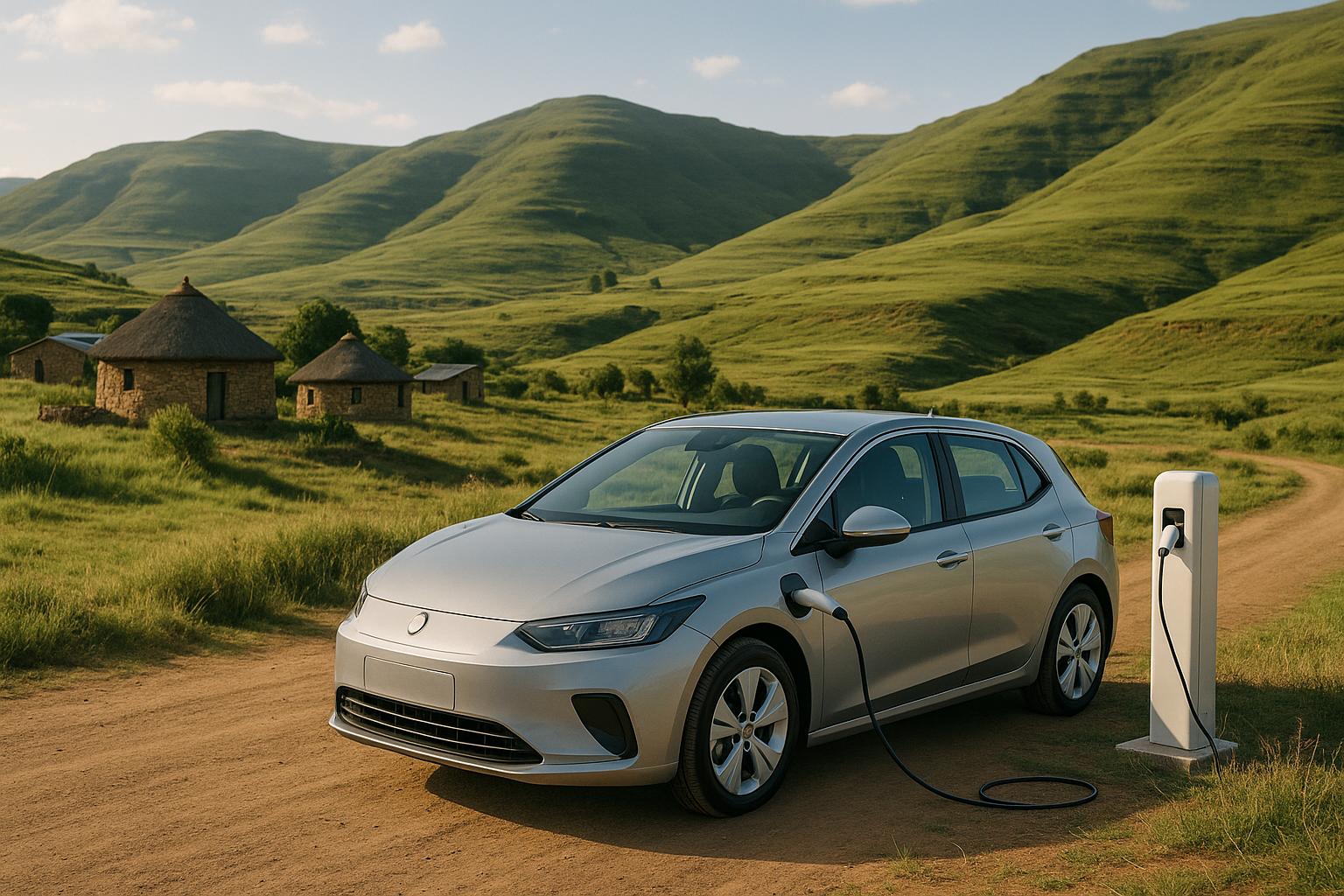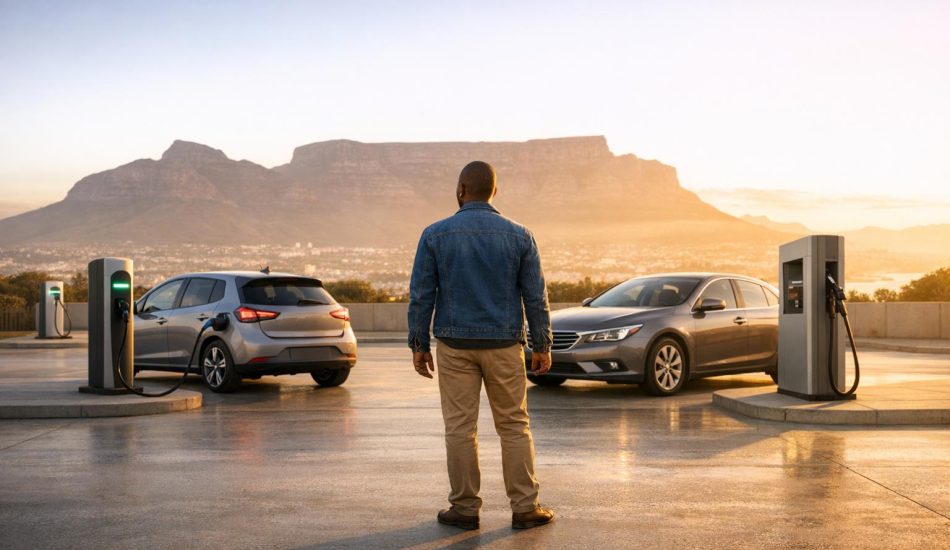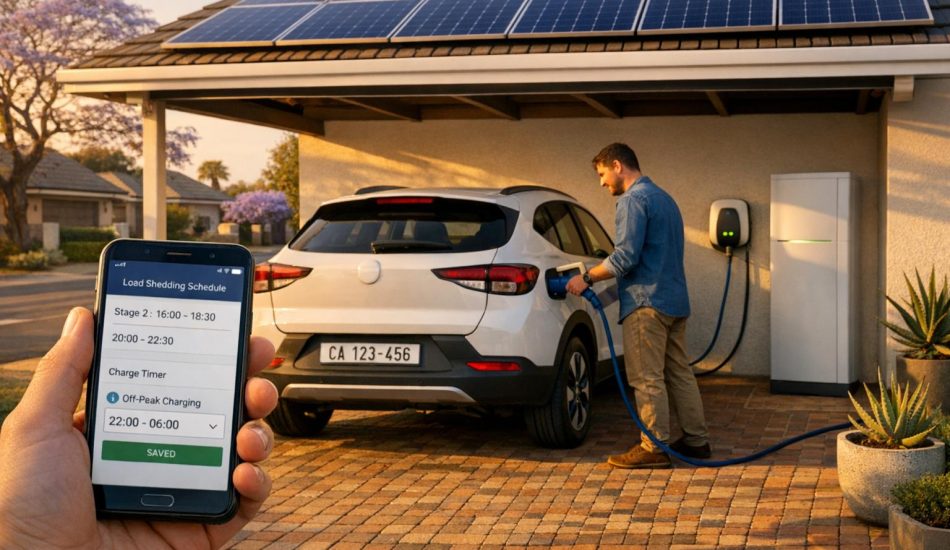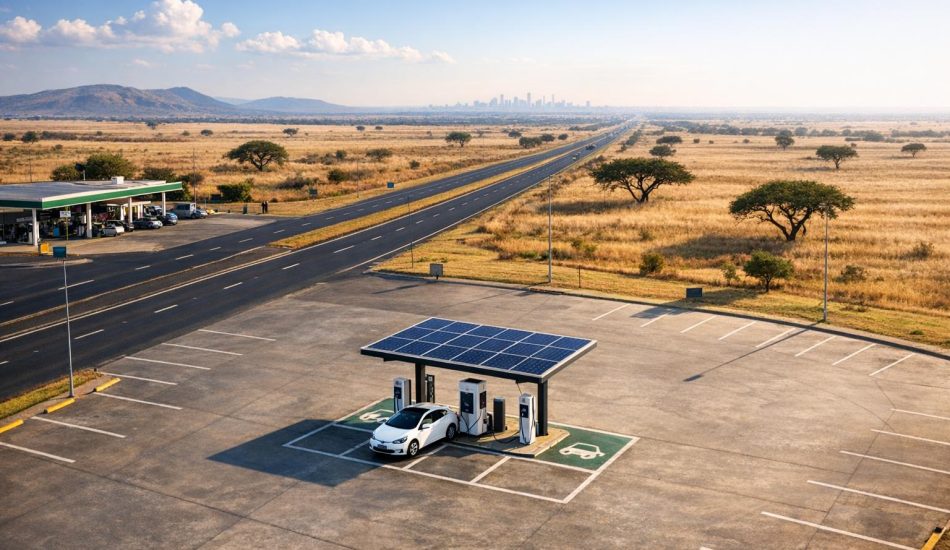
Electric cars are gaining attention in Lesotho, but deciding whether they’re right for you requires weighing their benefits and challenges. Here’s a quick breakdown:
- Advantages of EVs: Lower fuel and maintenance costs, zero direct emissions, and smooth performance for city driving. Lesotho’s hydroelectric power generation can also make EVs a cleaner option.
- Challenges of EVs: High upfront costs, limited charging stations (mostly in urban areas), unreliable power supply, and reduced battery performance in mountainous terrain.
- Gasoline/Diesel Cars: These are cheaper to buy, have widespread fuel and repair networks, and perform well on steep roads, but they come with higher long-term costs and emissions.
Key takeaway: If you drive mostly in cities and can manage the charging infrastructure, EVs are a solid choice. For rural or long-distance driving, gasoline or diesel cars remain more practical. The future of EVs in Lesotho depends on improving infrastructure and grid reliability.
1. Electric Cars in Lesotho
Cost of Ownership
Owning an electric car in Lesotho comes with both financial perks and challenges. In 2025, the government introduced new EV Import Rules, removing VAT and customs duties for electric vehicles, which has made them more affordable for buyers. However, the upfront cost of these vehicles remains steep. Many of the models available through platforms like EV24.africa are from high-end brands such as Tesla, BYD, and Hyundai. Even with financing options, monthly payments can stretch household budgets.
On the bright side, maintenance costs are generally lower for electric vehicles. With fewer moving parts compared to traditional cars, EVs require less frequent servicing. Routine expenses like oil changes, spark plug replacements, and transmission repairs become a thing of the past, potentially saving owners hundreds of dollars annually. That said, when repairs are needed, the limited availability of specialized technicians and spare parts in Lesotho can lead to higher costs, adding a layer of complexity for EV owners.
These economic factors tie directly into the practical hurdles of using electric cars daily.
Infrastructure and Accessibility
The success of electric vehicles in Lesotho depends heavily on the availability of reliable infrastructure. Unfortunately, the country faces significant obstacles in this regard. Lesotho is not among the 12 African nations identified as having "high EV readiness", and charging access in rural areas remains a major issue.
Another pressing concern is grid reliability. Only eight African countries meet high standards for consistent power supply, and Lesotho is not one of them. Power outages, particularly in rural regions, make it difficult for EV owners to rely on regular charging. For those planning longer trips across Lesotho’s mountainous terrain, this becomes an even bigger challenge. The rugged landscape adds to the difficulty, as most charging stations are clustered in urban areas like Maseru, leaving rural residents with limited options.
Impact on the Environment
Despite the challenges, electric vehicles bring clear environmental benefits to Lesotho. The country has committed to international climate goals as part of the Paris Agreement and supports Sustainable Development Goal 7, which focuses on cleaner energy solutions by 2030. EVs, with their zero tailpipe emissions, can significantly improve urban air quality.
"Even though the idea of electric cars has been around for a while, it has attracted a lot of attention in the last ten years due to the growing carbon footprint and other environmental effects of fuel-powered cars."
However, the environmental impact of EVs isn’t entirely straightforward. Lesotho imports much of its electricity from South Africa, where coal still dominates energy production. Additionally, 69% of the country’s energy consumption relies on biomass, leaving coal, petroleum, gas, and electricity to cover the remaining 31%. This means that while EVs themselves produce no emissions, their overall environmental footprint depends on the energy sources powering the grid.
Performance and Reliability
Lesotho’s unique geography and climate present specific challenges for electric vehicles. The steep terrain and cold winters can reduce battery range, requiring more frequent charging and careful planning for longer trips, especially in high-altitude areas.
Another hurdle is the limited number of repair shops equipped to handle EVs. While electric cars generally need less maintenance, finding qualified technicians can be difficult, and delays in sourcing replacement parts can extend repair times. On the flip side, EVs offer some clear performance advantages. Their instant torque makes climbing steep roads easier, and the quiet operation and smooth acceleration enhance the overall driving experience, particularly for urban commutes. These features make them appealing for daily use, even if some practical challenges remain.
Lesotho | Country takes a step towards an electric future
2. Gasoline and Diesel Cars in Lesotho
Examining gasoline and diesel vehicles sheds light on how they compare to the electric cars discussed earlier, especially in terms of cost, infrastructure, environmental impact, and performance.
Cost of Ownership
Gasoline and diesel cars remain a popular choice in Lesotho, largely due to their lower upfront price tags. Many buyers focus more on the initial purchase cost than on the long-term expenses of fuel and maintenance. While imported vehicles may seem like a bargain initially, they often come with higher running costs, especially for fuel and upkeep.
Diesel engines, known for their high torque, are particularly suited to Lesotho’s steep and rugged terrain. On the other hand, gasoline engines are easier to maintain and perform well in urban settings. However, engine size plays a big role in fuel consumption – so unless there’s a specific need, oversized engines are best avoided.
Beyond the purchase price, the availability of fuel and repair services also plays a major role in choosing a vehicle.
Infrastructure and Accessibility
One of the biggest advantages of gasoline and diesel vehicles in Lesotho is the existing infrastructure. Fuel stations are widely available in both cities and many rural areas, making refueling convenient. Additionally, the petrol levy collected at these stations helps fund road maintenance throughout the country.
When it comes to repairs, services for gasoline and diesel cars are easier to find. Spare parts are more accessible, and routine maintenance is generally straightforward. This established network of support ensures that owning these vehicles is relatively hassle-free.
Despite the convenience, the environmental impact of these vehicles cannot be ignored.
Impact on the Environment
Gasoline and diesel cars are a significant contributor to environmental issues in Lesotho. Road transport has been identified as a leading source of greenhouse gas emissions in Southern Africa, including neighboring South Africa. These vehicles release harmful tailpipe emissions, which can degrade air quality, particularly in urban areas like Maseru.
Performance and Reliability
Over the years, gasoline and diesel vehicles have proven their reliability under Lesotho’s tough conditions. Diesel cars shine in mountainous regions thanks to their high torque, making them ideal for hilly terrain. Meanwhile, gasoline cars are easier to maintain and are well-suited for city driving.
sbb-itb-99e19e3
Pros and Cons Summary
When comparing electric vehicles (EVs) to gasoline and diesel cars in Lesotho, it’s clear each comes with its own set of advantages and challenges.
EVs offer the promise of lower running costs thanks to reduced fuel expenses and minimal maintenance requirements. They also produce zero direct emissions, which can help improve air quality in urban areas like Maseru. However, the limited availability of charging stations – mainly clustered in cities – leaves rural areas underserved.
"Power supply constraints in South Africa are not conducive to rapid adoption of EVs as charging would burden the energy system." – ScienceDirect
On the other hand, gasoline and diesel vehicles benefit from a well-established network of fuel stations and repair facilities. Their lower upfront costs and the convenience of quick refueling make them a practical choice, even though they come with higher long-term expenses.
| Vehicle Type | Pros | Cons |
|---|---|---|
| Electric Cars | • Lower fuel and maintenance costs • Zero direct emissions |
• Limited charging stations • Grid instability and load shedding • High upfront costs • Range anxiety on long trips • Long charging times |
| Gasoline/Diesel Cars | • Extensive fuel station network • Lower purchase prices • Established repair services • Quick refueling (5 minutes) • Proven reliability |
• Higher fuel and maintenance costs • Contributes to greenhouse gas emissions |
The region’s infrastructure challenges further widen the gap. For example, South Africa recently opened its first off-grid, solar-powered EV charging station in March 2025 and plans to roll out 120 more along major highways. Yet, compared to global leaders like Norway, the Netherlands, and China, Southern Africa remains far behind in EV infrastructure development.
For EV owners, range anxiety is a persistent issue, especially on long or remote trips. Even with fast DC chargers, it takes about 30 minutes to charge an EV to 80% capacity – significantly longer than the five minutes needed to refuel a gasoline or diesel vehicle.
Adding to the complexity, Lesotho’s electricity grid relies heavily on non-renewable energy sources. As a result, charging an EV can sometimes generate more carbon emissions than driving a newer internal combustion engine vehicle. This could shift over time as the grid incorporates cleaner energy sources.
For now, gasoline and diesel vehicles offer more immediate practicality, but as infrastructure evolves, the balance may start to tip in favor of EVs.
Final Thoughts
When deciding whether to buy an electric car in Lesotho, it all comes down to your personal circumstances and driving patterns. While EVs promise long-term perks like lower fuel expenses and fewer maintenance headaches, the current infrastructure hurdles mean they’re not the right fit for everyone just yet.
If your driving is mostly city-based, EVs could be a smart choice. For those with predictable commutes under 100 miles and access to charging – either at home or work – electric cars can deliver real savings over time. Business owners managing fleets for urban deliveries may also find EVs an economical option, especially as fuel prices continue to climb.
On the other hand, if you frequently travel long distances or spend time in rural areas, traditional vehicles remain the safer bet. The widespread availability of fuel stations and repair shops ensures you won’t face the risk of being stranded with a drained battery or struggling to find service.
Upfront costs for EVs are higher, but they can pay off for buyers with steady incomes and long-term plans. If you’re on a tighter budget or tend to switch vehicles often, conventional cars might be the better financial option for now.
The charging and power infrastructure in Lesotho is improving, albeit gradually. As more charging stations become available and the electricity grid stabilizes, EVs will become a more realistic option for a broader range of drivers. For early adopters who are willing to navigate the current limitations, electric cars already offer a glimpse of what the future of transportation in Lesotho could look like.
If you’re eager to explore electric vehicle options, platforms like EV24.africa make the process easier. They provide access to various EV brands and offer delivery services across Africa, making it simpler to find the right EV even in regions with limited local availability.
Ultimately, your decision isn’t just about today – it’s about what you expect from tomorrow. Whether you prioritize immediate convenience or want to embrace the future of driving, your choice will reflect both your current needs and your vision for what’s ahead.
FAQs
What should I consider when choosing between an electric car and a gas-powered car in Lesotho?
When weighing the choice between an electric car and a gas-powered car in Lesotho, there are a few important aspects to keep in mind:
- Charging infrastructure: Charging stations are still sparse in many areas of Lesotho. This could make owning an electric car less convenient, especially if you’re traveling outside major towns or cities.
- Electricity reliability: Consistent access to electricity is essential for charging an electric vehicle. If your area experiences frequent power outages, this could pose a challenge.
- Costs: While electric vehicles can help you cut down on fuel and maintenance expenses, their upfront price is often higher than that of gas-powered cars. Don’t forget to factor in electricity costs and how much you might save over the long term.
By carefully considering these points, you can decide whether an electric car fits your lifestyle and the specific conditions in Lesotho.
What challenges does Lesotho’s infrastructure pose for owning an electric car?
Lesotho faces a few hurdles when it comes to supporting electric vehicle (EV) ownership. One major issue is the limited number of public charging stations, making long-distance travel a challenge for EV drivers. Additionally, electricity supply in some areas can be inconsistent, which might complicate the convenience of charging at home.
Another factor to consider is Lesotho’s dependence on imported automotive components, including semiconductors. This reliance can sometimes lead to supply chain delays, impacting both the availability of EVs and their maintenance. That said, owning an EV in Lesotho still comes with perks, such as lower fuel costs and a reduced environmental impact – particularly for those who have steady access to electricity.
What are the long-term advantages of owning an electric car in Lesotho despite current challenges?
Owning an electric car in Lesotho comes with several long-term perks that can make it a smart choice despite some initial hurdles. A major advantage is the reduced fuel costs. Electricity is typically cheaper than gasoline or diesel, which means you could save a lot of money in the long run.
Another key benefit is that electric vehicles (EVs) generate no tailpipe emissions, making them a cleaner option for the planet. This can help cut down on air pollution and promote a healthier environment. Plus, as EV technology improves and charging stations become more accessible across Lesotho, owning an electric car is likely to become even more practical and affordable.




